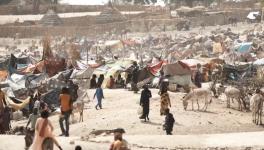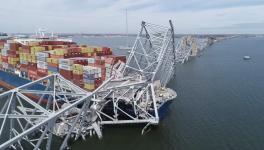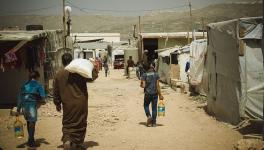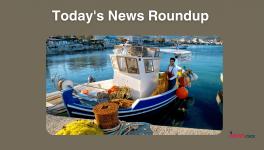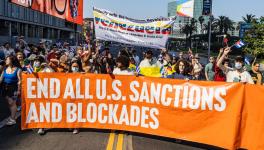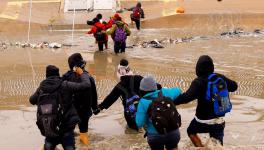As European Powers Squabble, Migrants Struggle to Stay Afloat
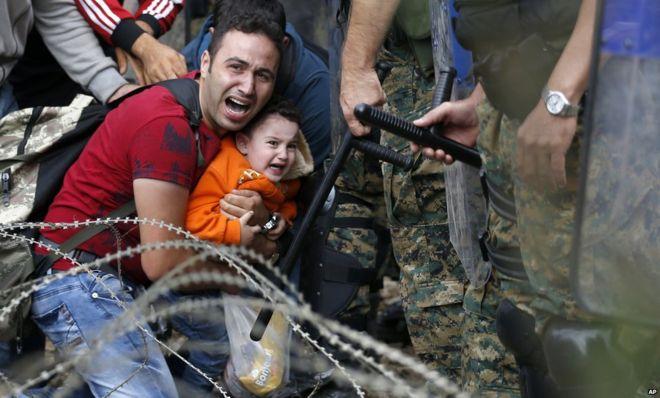
Image Coutesy: BBC News
Over the past week, a ship that rescued refugees from conflict-torn north Africa became the centre of an acrimonious dispute between European countries. The incident raised questions over Italy’s approach to the issue in the aftermath of the new government coming to power and also exposed the lack of clarity among the countries of the region on how to deal with it. Meanwhile, over 600 people waited in fear in an overcrowded boat, their future uncertain.
The migrants had left Libya on cheap rubber boats. When they were rescued from the sea in groups, many were found to have swallowed sea water and were suffering from hypothermia. At least 15 had suffered serious burns from chemicals that had leaked from the boats. Around 400 were rescued by the Italian navy, coast guard and merchant vessels and were transferred aboard the MS Aquarius, a ship operated by the German branch of the European maritime humanitarian organisation, SOS Mediterranee, in coordination with Maritime Rescue Coordination centre in Rome. On June 9, 229 more refugees were rescued in six different operations carried out throughout the night by those operating the ship.
The boat which had a carrying capacity of 550 now held 629 migrants, 123 of whom were minors unaccompanied by adults. There were also 11 children and seven pregnant women. Many Nigerian women on board, who were working as domestic servants, had survived rapes in Libya.
The MS Aquarius headed north, hoping to safely dock at a port in the island of Sicily in Italy. However, when it was 35 nautical miles away from Sicily and 27 nautical miles from the island nation of Malta, the boat received instructions to stand by from the Italian Maritime Rescue Coordination Centre.
It turned out that the Italian Interior Minister Matteo Salvini, who had assumed office this month after his far-right party, The League, formed a government in coalition with the populist party Movement Five Star, had denied permission for the vessel to dock at Italian ports.
Many mayors in the south of Italy protested this decision and expressed their readiness to allow the ship to dock at the ports of their cities even if it meant defying Salvini’s orders. The mayor of the city of Palermo in Sicily said, “Palermo in ancient Greek meant ‘complete port’. We have always welcomed rescue boats and vessels who saved lives at sea. We will not stop now. Salvini is violating the international law. He has once again shown that we are under an extreme far-right government.’’
Salvini argued that since Malta was closer to where the MS Aquarius was waiting for further instructions, it was obliged to allow the ship to dock at one of its ports. Malta responded, saying that the country had nothing to do with the rescue which was being coordinated by Italy.
“Malta takes in nobody. France pushes people back at the border, Spain defends its frontier with weapons. From today, Italy will also start to say no to human trafficking, no to the business of illegal immigration,” Salvini posted on Facebook.
In the meantime, the crew of 12 on the MS Aquarius - which included a doctor, a midwife and two nurses from Médecins Sans Frontières (Doctors Without Borders) - were busy treating the injuries of those rescued and trying to reassure them as they began getting anxious about why the ship had suddenly stopped.
The new Prime Minister of Spain, Pedro Sánchez, from the Spanish Socialist Workers' Party then came forward to offer the vessel safe harbour in the city of Valencia. The MSF, while welcoming the move, noted the practical difficulties involved:
“MSF welcomes the important gesture of humanity from Spain to disembark in Valencia. However, this would mean already exhausted people rescued at sea would have to endure four more days exposed to the elements on the deck, in an overcrowded boat already well over maximum capacity and in deteriorating weather conditions. The better option would be to disembark the rescued people in the nearest port, after which they can be transferred to Spain or other safe countries for further care and legal processing.”
The MSF statement also described the condition of the passengers. “MSF is particularly concerned about several critical drowning and hypothermia patients who had to be resuscitated. These patients are being closely monitored on board as they could quickly develop significant pulmonary issues after swallowing sea water. Many rescued people have reported aspiration and are therefore at risk of developing pulmonary disease or pneumonia over the coming days. There are also 21 patients on board who have suffered severe chemical burns after being exposed to a toxic mixture of sea water and fuel for an extended period of time. These patients are stable but will need ongoing wound care and dressing changes over the coming days and weeks. Finally, there are several serious orthopaedic cases with associated infections that need immediate surgical evaluations and operations, which MSF is unable to provide on the ship.”
However, neither Italy nor Malta budged. Instead, Italian coast guard and Maltese navy vessels supplied food and water bottles to those on the boats. 250 of the refugees were subsequently transferred to two Italian coast guard vessels and they, along with the MS Aquarius, set sail for Valencia on June 12.
“Italy cannot be Europe’s refugee camp”
Meanwhile, a diplomatic row broke out between Italy and France after French president Emmanuel Macron accused Italy of "cynicism and irresponsibility", with the ruling party's spokesperson adding, “The Italian position makes me vomit.”
Responding sharply, the Italian Prime Minister Giuseppe Conte said, “Italy cannot accept hypocritical lessons from countries that have always preferred to turn their backs when it comes to immigration”. Italy's deputy Prime Minister, Luigi Di Maio added, “It is rich coming from them [French]... I'm pleased that they have discovered responsibility. Let them open their ports and if they want we can send them a few people.”
Italy, along with Spain and Greece - the three countries worst affected by EU's austerity policies which has rendered the national governments incapable of addressing their economic crises - have been receiving the maximum number of migrants. In the last 5 years, Italy has received over 600,000 migrants from north Africa alone. “Italy”, Salvini said, “cannot be Europe's refugee camp.” Salvini’s party had campaigned on an anti-immigration platform in the recent elections.
The Italian government said in a statement that it had not abandoned the nearly 700 refugees in the boat and noted that France had often adopted “much more rigid and cynical immigration policies.”
Spain, which opened its port for the migrants, criticized not Italy but the EU for its immigration policies. The country's Foreign minister, Josep Borrell, said, “This is a shared problem and it has to be treated as a shared problem.. What Spain has done is undertake what you could see as a highly symbolic act – because at the end of the day, it only it involves a small number of people – that will oblige the EU to abandon its inability when it comes to dealing with the problem of migration.”
“When you look at the demographic figures you realise that we Europeans are engaged in ostrich politics, sticking our heads in the sand and thinking they can’t see us because we can’t see them,” he added.
Jana Ciernioch from SOS Mediterranee also pointed out that “It's not an Italian border where people die in the Mediterranean, it's a European one, and that requires European solutions.” The EU, however, instead of coming up a comprehensive strategy to deal with the crisis in a humane manner, has decided to triple the budget it spends on stopping “illegal immigration” to almost 6 billion dollars, and will have 10,000 guards to patrol its sea and land borders.
Meanwhile, the MS Aquarius and the two other Italian vessels continue sailing to Spain, plying the stormy ocean, negotiating waves of up to 4 meters and winds of up to 65 kilometers per hour. The rescued migrants are reportedly suffering from seasickness and continuous vomiting.
The primary task of Aquarius is rescuing migrants from the sea between north Africa and Europe, which an average of 220 people attempt to cross every day. With the vessel leaving its zone of operations, search and rescue operations will take a hit for at least 10 days till the ship returns once the migrants disembark and it is restocked for the voyage back.
The night when the MS Aquarius began the journey to Spain, 12 other migrants attempting to cross the sea to Europe drowned, and another 900 rescued by the Italian coast guard disembarked in Italy. Two corpses were also recovered from the sea.
Get the latest reports & analysis with people's perspective on Protests, movements & deep analytical videos, discussions of the current affairs in your Telegram app. Subscribe to NewsClick's Telegram channel & get Real-Time updates on stories, as they get published on our website.












